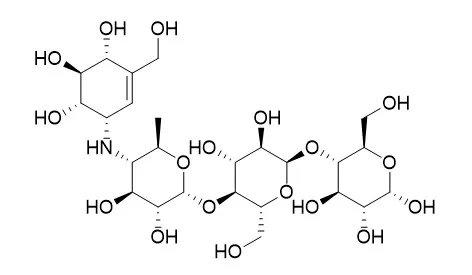| In vivo: |
| Spinal Cord Ser Cases. 2019 Aug 30;5:75. | | A case of postprandial hypotension in an individual with cervical spinal cord injury: treatment with acarbose.[Pubmed: 31632733 ] | Postprandial hypotension (PPH) is a postmeal drop in systolic blood pressure that may or may not be symptomatic. While the etiologies of PPH are incompletely understood, it is thought to occur when glucose absorption causes increased splanchnic blood flow or "pooling" in people who lack sufficient compensatory responses to support their systemic blood pressure. Postprandial hypotension is well described in individuals with neurodegenerative diseases, yet only rarely in people living with spinal cord injury (SCI). Acarbose is an alpha-glucosidase inhibitor that treats PPH by slowing gastric transit time and reducing glucose uptake in the small intestine, hence decreasing superior mesenteric artery blood flow.
METHODS AND RESULTS:
A 62-year-old woman with long-standing cervical SCI presented with 5 years of worsening postprandial lightheadedness, visual "flashes", and neck pain. She had had multiple episodes of near and frank syncope and her prior medical team had initiated midodrine three times daily. We began treatment with Acarbose, starting at 50 mg with each meal and rapidly titrating to 100 mg at mealtime. She noticed an immediate improvement in her symptoms and an attenuation of postmeal drops in both systolic and diastolic blood pressures.
CONCLUSIONS:
To our knowledge, this is one of the first described cases of PPH among people living with SCI. Given the autonomic dysfunction that frequently accompanies higher-level of injuries, it is possible that many more people with SCI have this condition, whether or not it is symptomatic. Acarbose is one of the several established treatments for PPH, and proved effective and tolerable for our patient. | | Diabetes Res Clin Pract. 2003 Jan;59(1):37-42. | | Acarbose in the treatment of elderly patients with type 2 diabetes.[Pubmed: 12482640 ] | To study the effect of Acarbose, an alpha-glucosidase inhibitor, on glycemic control in elderly patients with type 2 diabetes.
METHODS AND RESULTS:
Elderly patients with type 2 diabetes treated with diet alone were randomly treated in a double-blind fashion with placebo (n=99) or Acarbose (n=93) for 12 months.
After 12 months of therapy, there was a statistically significant difference in the change in glycated haemoglobin (HbA(1c)) (-0.6%) in the Acarbose group versus placebo, as well as in the incremental post-prandial glucose values (-2.1 mmol h/l) and mean fasting plasma glucose (-0.7 mmol/l). Although there was no effect of Acarbose on insulin release, there was a clear effect of Acarbose to decrease relative insulin resistance (-0.8) (HOMA method). In addition, Acarbose was generally well tolerated and safe in the elderly; most discontinuations were due to gastrointestinal side effects such as flatulence and diarrhea. There were no cases of hypoglycemia reported, and no clinically relevant changes in laboratory abnormalities or vital signs during the study.
CONCLUSIONS:
Acarbose improves the glycemic profile and insulin sensitivity in elderly patients with type 2 diabetes who are inadequately controlled on diet alone. |
|






 Cell. 2018 Jan 11;172(1-2):249-261.e12. doi: 10.1016/j.cell.2017.12.019.IF=36.216(2019)
Cell. 2018 Jan 11;172(1-2):249-261.e12. doi: 10.1016/j.cell.2017.12.019.IF=36.216(2019) Cell Metab. 2020 Mar 3;31(3):534-548.e5. doi: 10.1016/j.cmet.2020.01.002.IF=22.415(2019)
Cell Metab. 2020 Mar 3;31(3):534-548.e5. doi: 10.1016/j.cmet.2020.01.002.IF=22.415(2019) Mol Cell. 2017 Nov 16;68(4):673-685.e6. doi: 10.1016/j.molcel.2017.10.022.IF=14.548(2019)
Mol Cell. 2017 Nov 16;68(4):673-685.e6. doi: 10.1016/j.molcel.2017.10.022.IF=14.548(2019)